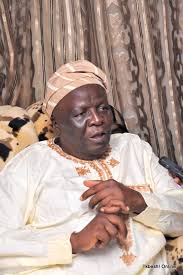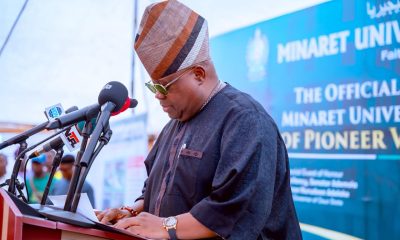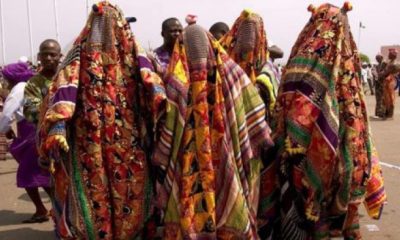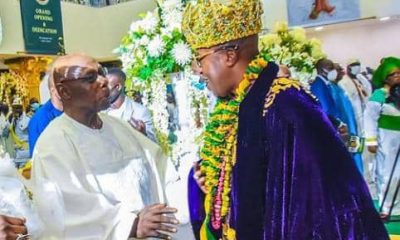News
TRADITIONAL INSTITUTION AND THE CHANGE MANTRA By Akinrun of Ikinrun

TRADITIONAL INSTITUTION AND THE CHANGE MANTRA
Things started to go wrong in this country some years ago. But the climax was reached about four or five years ago and it has persisted till today. The Country is now deeply in the woods- it is bedeviled by a myriad of problems ranging from political and socio-economic problems.
A lot have been said about the nature and causes of these problems in the print and electronic media, and as such become a common-knowledge. It will, therefore, amount to needles repetition to go over them again. However, one can submit by way of summary that inept leadership of the recent past is a major contributor to the present predicament in which the country finds itself.
It is the nature of man, that when he experience difficulty, he wants to find a way out of it. This is why there is general clamour for change. And this is why it is a happy note that the slogan or motto of the present administration is CHANGE. It is also a happy note that the present administration is leaving no stone unturned in ensuring that the desired change is realized. The government cannot be left alone in this arduous task; all hands must be on deck to compliment the effort of the government. In line with this belief, the object of this write-up is to suggest ways that the traditional institution (traditional rulers) can effectively come in. When we talk of key stakeholders in this country; traditional rulers cannot be left out. They are the purveyors of matured and elderly advice.
In any society or community, there are four possible behavioral patterns. These are the existence of:
- Good leadership and good followership;
- Good leadership and bad followership;
- Bad leadership and good followership; and
(d) Bad leadership and bad followership.
With a combination of good leadership and good followership, everything would work well. This would spell life more abundant for the society. This situation is rare to find as what is good cannot be all good- no absolutism in nature.
With a bad leadership/bad followership situation, nothing would work. There would be a Laissez-faire attitude. Again this is an absolute situation- nothing can be absolutely bad. Therefore, it is rare to have bad leadership/bad followership situation
It is, however, possible to have good leadership/bad followership situation. It then devolves on the leadership to manage the followers and eventually put them back on track. Thus, with a visionary and disciplined leadership, this situation is not a lost hope.
Bad leadership/good followership situation on the face of it is bad. But in democracy, through the ballot box, good followership can unseat bad leadership.
What the foregoing boils down on is that in any situation, what counts most is good leadership. Emphasizing this, Alexander the Great stated thus:
“I am not afraid of an army of lions
Led by a sheep, but I will be afraid
Of an army of sheep led by a lion”
It is therefore apt to conclude that with good leadership, the problems of this country would be a thing of the past.
By leadership, who are we referring to? Everybody is a leader in one way or the other. For instance, in a household, the father is in leadership position, though, he may be in a followership position in the community. The father playing a leadership role in the household has responsibility to harness the resources of the household and mobilize the other members of the house for development and progress of the entire family. It is the aggregation of the house that makes a community. Similarly, it is the aggregation of communities that makes the state.And also, it is the aggregation of the state that makes the country. If everyone who finds himself in the leadership position in each of the segment of the society plays his/her roles effectively, our society would be a good place to live in. Traditional rulers are in such a leadership position.
Traditional Rulers have inherent in their offices certain roles they must play. His Imperial Majesty, Late Oba Erediauwa of Benin Kingdom put it this way:
“Traditional Rulers have functions already laid down for them in their communities’customand traditions and they must strive toperform them without fear or favour as fathersof their people”.
What are these functions? They are:
- Curtailment of, and resolution of conflict to promote peaceful atmosphere and cohabitation of the various members of the community;
- Moral uplift of the society and maintenance of discipline;
- Promotion and preservation of culture and tradition of the people;
- Enhancement of defence and security;
- Information management and dissemination; and
(vi) Mobilization of the grassroots for development.
The traditional institution is well grounded in the performance of these functions. For instance, the traditional Nigeria society, before the arrival of the Colonialist, under the watch of the traditional rulers, was characterized by social norms which was the law or customary mode of behavior and which was mandatory for everyone to obey. Any infraction of a norm was often visited with punitive measures ranging from sanctions and death. On the other hand, however, display and adherence to the norm in his or her way of life was always recognized and rewarded with approbation and honours. This rule applied to the ordinary run of men in the society as it applied to the elders and traditional rulers. In particular, as the leader and symbol of the society, a traditional ruler was expected to lead exemplary life by observing strictly, the societal norm.
In other words, the Nigeriansociety was at the beginning, a disciplined one in which justice; probity, fair-play and security were the order of the day.
As the key stakeholder, the traditional rulers must key-in into the change mantra of the present administration to turn this country around. The institution can do this by unleashing its potentials, more especially in the areas of security, grassroots mobilization and discipline. Traditional Rulers must join hands with the government to fight corruption to put an end to all forms of inadequacy of character/behaviour, insurgency, and/or militancy. They must play stabilizing role to solve politically related and ethnicity problems. Let us hear what a writer said on this:
…We believe that the nation will be a better position to stem the tide of violence in our communities if traditional rulers play their roles as trusted upon them. Perpetrators of ethnic violence would have no place to hide if they are aware that their natural rulers are against them. Law enforcement will also find it easier to deal with culprits of communal clashes if the traditional rulers lend their helping hands by exposing the vandals in their domains.……..Their assistance is crucial to the national effort to stem the tide of bloody skirmishes in our communities.(Daily Times on the 31st October, 1997)
But to ensure their (traditional Rulers) effective performance, it is recommended that the provisions of the 1976 Edict assigning functions to the Local Government Traditional Council should be revisited and adopted.
The functions of a council established under this part shall be-
- To formulate general proposals as advice to the Local Government or to all Local Governments in its area;
- Where applicable, to harmonies the activities of such Local Government s through discussion of problems affecting them generally and by giving advice and guidance thereon to such Local Governments;
- To determine religious matters where appropriate;
- To give support for arts and culture;
- To assist in the maintenance of law and orders;
- To advice on any matter referred to it by the State or federal Government;
- To make representations or express opinions to the State Government or any Organisation on behalf of the Local Government, or as the case may require, the collective behalf such Local Government on any matter of concern to the area as a whole whether or not such as matter is within the legislative competence of any such local Government;
- To determine questions relating to Chieftaincy matters and control of traditional titles and, where such matter are within the exclusive prerogative of the principal Chief, to give advice thereon where so requested;
(i) Notwithstanding any other provision of this Law, to determine customary law and practice on all matters governed by customary law including land tenure customary law.
The beauty of the edict is that it will motivate and encourages creativity and dynamism on the part of the traditional rulers.
The present crops of traditional rulers are highly enlightened. Among these traditional rulers , there are many who have university degrees and many more have professional qualifications. Besides, a great number of them have acquired wide and rich experiences in life and adequate exposures in various fields of human endeavors. There are among them, academic professors, medical doctors, diplomats, lawyers, business executives, seasoned administrators, and retired service men (civil, military and police) to mention a few. The adoption of the 1976 edict as stated above will make it possible for the traditional rulers to unleash their potentials.
CONCLUSION
Traditional Rulers are the fathers of the nation. They cannot fold their arms when things are going wrong in the country. It has therefore become an imperative for them to cooperate with the government at all levels and act to complement their (government) efforts in bringing happiness to the people.
BY HIS ROYAL MAJESTY OBA OLAYIWOLA OLAWALE
ADEDEJI (MFR) – THE AKINRUN OF IKIRUN
-

 News4 days ago
News4 days agoInsecurity: Kogi Schools Resume On Monday
-

 Opinion4 days ago
Opinion4 days agoDon’t Pull the Plug: Why Nigerians Are Pleading for the U.S. to Extend Its Police Training Program — and Why It Must Synergize With New Military Arrivals
-

 Crime3 days ago
Crime3 days agoVigilante Reportedly Shoots Colleague Dead In Plateau
-

 Crime5 days ago
Crime5 days agoPolice Arrest Two Over Murder Of 62-Year-Old Woman In Oyo













